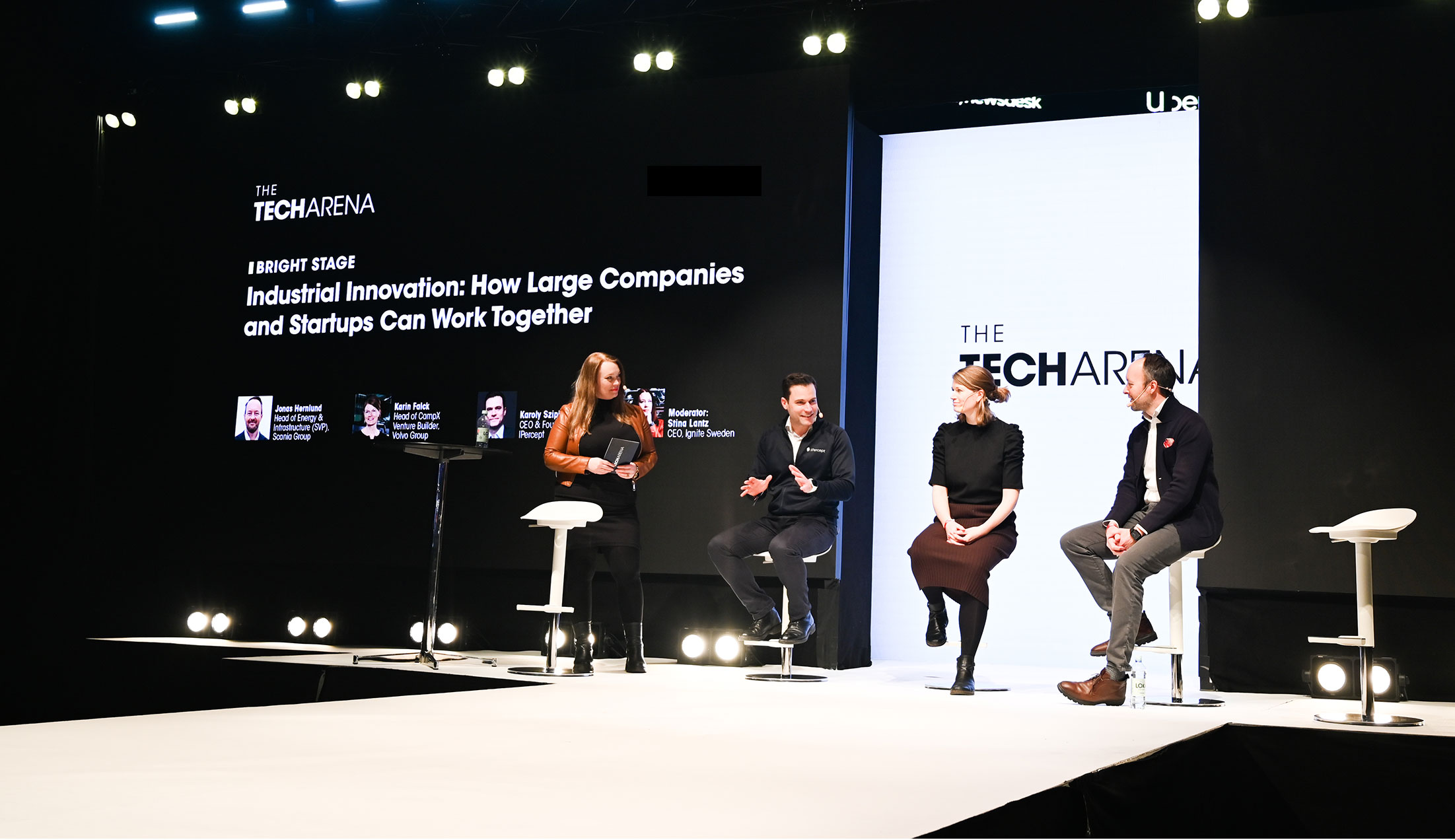
Published
- Trends
- Digital
- Tech
Large corporates take on the future with tech startups
David meets Goliath in a race for innovations where everyone’s a winner: Leading Swedish truck exporters Scania and Volvo share their advice on how to successfully embrace the startup community.
Large corporations have realised they need to look outside, open up and form new partnerships.
No man is an island – and neither are corporations. The gigantic challenges posed by the energy transition required to halt climate change – and the need for electrification – call for fresh thinking and new ideas. Since this is often found among tech startups and scaleups, large corporations increasingly favour structured collaboration and partnerships with the best and the brightest.
The international tech event Techarenan in Stockholm in February offered business leaders from around the world a chance for speed dating and exchanging ideas with the thriving Swedish startup community. EKN participated, along with many of its customers, among them Swedish truck makers Scania and Volvo.
Digitalisation, automation and electrification are some areas where the transport sector is on the hunt for new solutions. At Techarenan, Scania and Volvo testified to the value of partnering up with startups in solving future challenges.
Karin Falck, Head of CampX Venture Builder at Volvo says the attitude towards working with startups has changed considerably over the past years. “Large corporations have realised they need to look outside, open up and form new partnerships. We can’t do everything on our own.”
Jonas Hernlund is Head of Energy & Infrastructure at Scania and agrees that the perceived value of partnerships with startups has increased greatly. “The electrification of the transport system is a major challenge where Sweden needs to stay at the forefront. Swedish industry has been good at innovating for 100 years, but it has been a rather closed ecosystem. For the next 100 years we need to do it differently and be more open. We need to create a culture of listening and be willing to enter into joint ventures with startups. This was all unthinkable just 10 years ago.”
Scania and Volvo participated in a panel entitled “Industrial Innovation: How Large Corporations And Startups Can Work Together.” They were joined by Karoly Szipka, founder of Swedish startup Ipercept, which specialises in predictive maintenance and machine operational improvement solutions. “I believe we are witnessing the democratisation of innovation,” he said.
Strong startup ecosystem
Sweden is home to a large number of tech startups, of which some have grown to become successful brands across the world, such as Spotify and game developer King. Szipka testifies to a startup ecosystem, where banks, venture capitalists, banks, academia and government agencies like EKN cooperate to support startups: “We are a product of the Swedish innovation ecosystem and would not have existed without it.” Ipercept currently cooperates with 13 large industrial corporations.
Many startups fear ending up in the so-called “POC (Proof Of Concept) graveyard”. How can large corporates support the journey? “To us, the POC is the point of entry”, says Falck. “It’s important for the startup teams to get to know our organization and network with it. The launch and integration is the next step required to avoid the graveyard. Contracts and clear expectations on both sides are important success factors.”
The purpose of CampX at Volvo is to accelerate technology and innovation via partnerships and help bring it to the market. “We have started 80 projects with startups over the last 2–3 years, two thirds of them are very successful,” says Falck.
How does Volvo decide which innovations should be supported? “We are working closely with our product owners to understand their gaps and needs. We bring them in early and they decide which startups they want to work with.”
Hernlund adds that, “We are bringing on board all sorts of people now, both from Silicon Valley and local startup ecosystems. We have a structure in place to do so, including venture capital and teams, and a frame within which to execute.”
A key to successful collaboration is to be realistic and transparent, says Szipka: “Make sure that the business owners become your missionaries inside the client company. Find the right scaling plan, one that is not too fast but ensures sustainable accelerated value. Be very transparent on both sides and don’t oversell. Be realistic.”
50% of trucks electric by 2030
At Scania, Hernlund described the main challenge of today: “An electrified sustainable transport system is the future and we believe half of our sales in 2030 should fall under that category. The challenge, however, to SMEs is that the price of an EV is still 2-3 times higher than for a traditional diesel truck. On top of that there are organisational challenges, digital route planning, charging, and other challenges that need to be resolved.”
To solve these challenges and help fund them, Scania has established a venture fund called Scania Growth Capital, which has set up a joint venture with German startup Sennder. “It is a freight forwarder start-up that provides small and midsize customers with a transport contract with a pay-per-use model for EVs. We are scaling up our fleet of pay-per-use vehicles and hope to reach 5,000 in Europe by 2030.”
Elsewhere, Scania and Volvo have delivered buses capable of running on biofuel to BRT (Bus Rapid Transit) systems in Latin America and Africa with the help of local-currency (in Colombia) financing from an international bank and guarantee from EKN. “This is just one example of how sourcing from Swedish know-how benefits areas such as infrastructure, with an eye on sustainability and digitalization. Eligibility for support from the Swedish export credit system makes the package even more attractive,” concludes Kjell Forsberg, Deputy Head of Business Area Large Corporates at EKN.

EKN for buyers in Swedish export transactions
Buy from Sweden and benefit from attractive financing.
EKN for buyers in Swedish export transactions
EKN for large corporates
More and bigger export transactions for companies with an annual turnover of more than SEK five billion.
EKN for large corporates